Jeff Sessions: ‘I don’t follow tweets as closely as I used to’
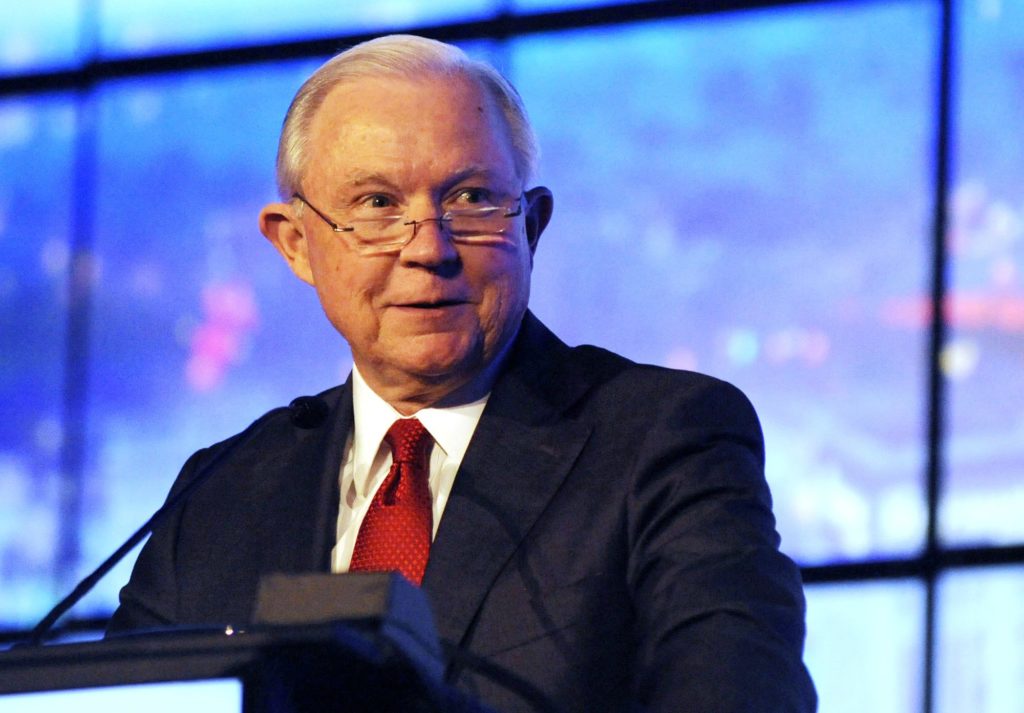
Former Attorney General Jeff Sessions lavished praise on what he called President Donald Trump’s policy accomplishments Tuesday but added that he’s backing away from his former boss’s favorite social media platform. Listing achievements that he said included improving the economy, fighting crime and supporting police officers, Sessions said he was proud of his time running the Justice Department. But more than a month after he was forced out of his job as the nation’s top law enforcement official after a tumultuous tenure in which he was repeatedly maligned by Trump, Sessions said he was “attempting to chill out a bit.” “You can be sure I don’t follow tweets as closely as I used to,” Sessions said to laughter and applause. Sessions, a former U.S. attorney and Alabama state attorney general, said he knew running the Justice Department involved making decisions that could create controversy. “This very public adventure, I’ve got to say, exceeded my expectations,” Sessions said. He infuriated Trump by recusing himself from the Justice Department’s investigation of alleged Russian meddling on behalf of Trump in the 2016 election. But at times Sessions sounded like he was still part of Trump’s team, repeatedly using the word “we” to describe things going on in Washington. He once invoked Trump’s campaign slogan, “Make America Great Again.” The former U.S. senator didn’t say whether he might try to regain the seat now held by Alabama Democratic Sen. Doug Jones. Republished with permission from the Associated Press.
ACLU of Alabama sues Sec. of State John Merrill for blocking constituents on personal Twitter
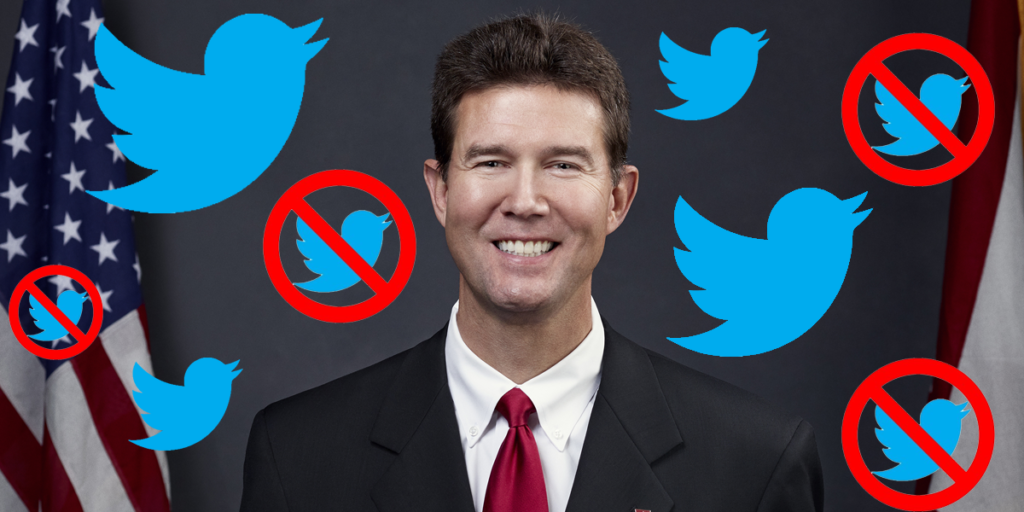
President Donald Trump made headlines last summer for blocking American on Twitter for the political views they have expressed, which ultimately resulted in a successful plaintiff’s lawsuit on grounds that the action was unconstitutional and a violation of the First Amendment. Now a similar case has made its way to the Yellowhammer State. On Wednesday, the American Civil Liberties Union of Alabama filed a lawsuit on behalf of three Alabama citizens challenging Secretary of State John Merrill for blocking them on his @JohnHMerrill Twitter account, claiming as an elected government official, his actions violate the First Amendment to the United States Constitution. The plaintiffs in the suit are: Kimberly Fasking: a law student at the University of Alabama, was blocked after asking about crossover voting. Heather Melvin Boothe: was blocked for stating “Good point! Ballot has major typo.” Herbert Hicks: a farmer and educator, who was blocked after asking Merrill about a speaking engagement. “It is upsetting to me that the Secretary of State, who primarily uses his Twitter account to disseminate information on issues related to his office, has also weaponized that account by blocking those with whom he disagrees politically,” said Fasking. “It is not the Secretary of State’s job to communicate only with those who agree with him, but with all of the people of the State of Alabama. I am disappointed that I no longer have ready access to information from the Secretary of State’s office in a way that allows me to engage meaningfully on topics that I find incredibly important.” Not his official account But Merrill’s office explained to Alabama Today that the @JohnHMerrill account is in fact not the Secretary’s official Twitter account. Rather, it’s his personal account that he maintains from personal devices. While Merrill does use the account to discuss state business, such as election law, information about his duties as Alabama Secretary of State, reminders to the public about upcoming elections, he maintains the @alasecofstate account for actual, official business. John Bennett, Deputy Chief of Staff and Press Secretary for Merrill confirmed the official account has never blocked any constituents. He further shared an example of why some people were blocked on Merrill’s personal account, saying that when he shared that his father died they celebrated the news. Merrill himself weighed-in on the lawsuit Wednesday afternoon calling it a “political hack-job.” “The lawsuit filed today by the ACLU of Alabama is an attempted political hack-job,” Merrill posted on Facebook. “Members of this liberal group are attempting to create an issue concerning lack of access to public officials that simply does not exist. As every member of the media and general public who interacts with this office knows, the most important thing for an elected official to do is to remain accessible to the people of this state. That is why I always make my cell number 334.328.2787 available to all Alabamians.” He also confirmed the account noted in the suit is his personal Twitter account. “The account in question @JohnHMerrill is exclusively my account, while the account @alasecofstate is the state’s public account, and this account has never blocked anyone from viewing any of the posts on its page. The @JohnHMerrill account has remained a personal account since its creation, in October 2009,” Merrill added. “I am recognized as one of the most accessible and personally available elected officials in the history of the state of Alabama, which is why I visit all 67 counties each year. It is my desire to continue to be recognized in that way as long as I have the privilege to continue to serve in public office.” Nevertheless the ACLU contends constituents should have access to that personal account because Merrill holds a state office. “In the digital age that we live in, John Merrill as a government official does not get to pick and choose who receives information on Twitter just like he can’t kick out his constituents for their beliefs at a town hall,” stated ACLU of Alabama attorney Brock Boone. “This is a violation of the First Amendment. It is worrisome that the individual in charge of free and fair elections chooses to discriminate against individuals on social media. As the Secretary of State, Merrill should be using his platform to inform the public, not censure them. The lawsuit seeks to stop Merrill from blocking plaintiffs or others based upon whether he agrees or disagrees with their viewpoint. The case, Fasking v. Merrill, was filed in the U.S. District Court for the Middle District of Alabama on September 19, 2018. *4:35 p.m. CT: This story has been updated with Merrill’s statement.
Facebook, Twitter defend efforts to stop election meddling
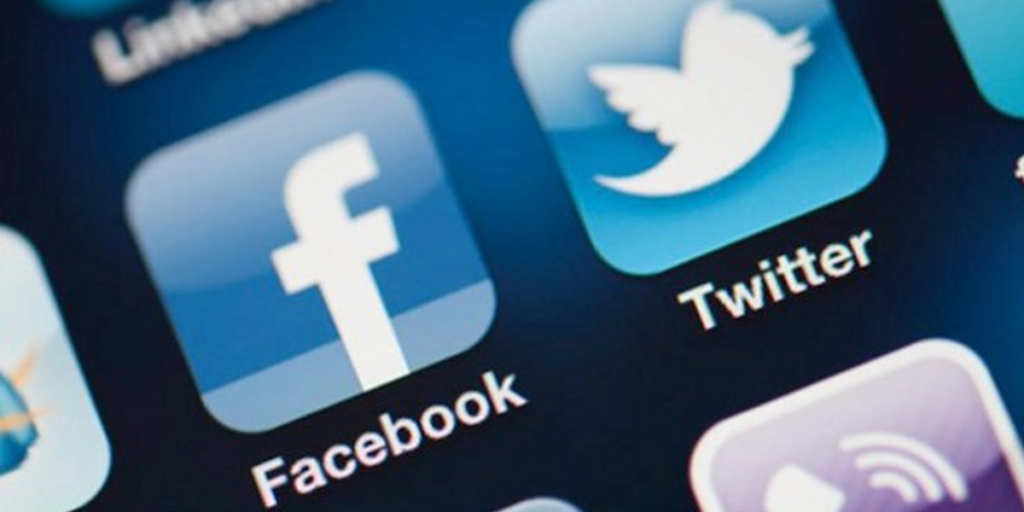
Facebook and Twitter executives, defending their companies on Capitol Hill, said Wednesday they are aggressively trying to root out foreign interests seeking to sow divisions in American democracy as the November elections near. Facebook’s No. 2 executive, Sheryl Sandberg, and Twitter’s CEO, Jack Dorsey, testified before the Senate intelligence committee, but there was an empty chair in place for Google’s parent Alphabet, which refused to send its top executive. Sandberg told senators that Facebook was “more determined” than adversaries trying to meddling in the upcoming elections, and she called the fight an “arms race,” as Facebook CEO Mark Zuckerberg has in the past. Dorsey was to appear later before a House committee amid complaints from Republicans that social media companies have shown evidence of bias against conservatives. In testimony released before that hearing, Dorsey denied that Twitter uses political ideology to make decisions. Congress has criticized the companies over the past year as Russia’s interference in the 2016 elections and beyond became clear. That scrutiny has led to additional criticism over the companies’ respect for user privacy and whether conservatives are being censored. “The companies have made progress, the government has made progress, but the bad guys have made progress as well,” said Virginia Sen. Mark Warner, the top Democrat on the Senate committee. Warner has proposed ways that the companies could be regulated for the first time. The later hearing before the House Energy and Commerce Committee was to focus on bias and Twitter’s algorithms. Some Republicans, including President Donald Trump, have pushed the idea that Twitter is “shadow banning” some in the GOP because of the ways search results have appeared. Twitter denies that’s happening. Absent from the Senate’s questioning was Google. The committee invited Larry Page, the CEO of Google’s parent company, Alphabet, but the company said it would send a lower-ranking executive instead. The committee rejected that offer. The committee chairman, Sen. Richard Burr, R-N.C., said Google doesn’t “understand the problem” if it doesn’t want to work with the government to find solutions. The back-and-forth with Google is the latest in a year’s worth of attempts by Congress to force the companies to focus more sharply on the Russian interference issue. While Burr said he believes Facebook and Twitter do understand the problem, it took both companies several months last year to acknowledge they had been manipulated. The companies have made many policy changes, and have caught and banned malicious accounts over the past year. Still, their business models — free services that rely on attracting as many users as possible for as long as possible and finding out as much about them as possible — remain the same. Sandberg, in her prepared remarks, detailed how Facebook was addressing the problem but reiterated that the company was slow to spot it. Thirteen Russians were indicted by special counsel Robert Mueller this year on charges of an elaborate plot to disrupt the 2016 U.S. presidential election by creating fake accounts that pushed divisive issues on social media. Dorsey said Twitter has continued to identify accounts that may be linked to the same Russian internet agency as identified in Mueller’s indictment. He said Twitter has so far suspended 3,843 accounts the company believes are linked to the agency, and has seen recent activity. On bias, the Twitter CEO said in prepared testimony before his second hearing that “”Twitter does not use political ideology to make any decisions, whether related to ranking content on our service or how we enforce our rules.” Only Dorsey was invited to the House hearing after specific Republican concerns about bias on Twitter. While all three tech companies have been accused of political bias against conservatives, the more public-facing nature of Twitter has made it an especially easy target. Republished with permission from the Associated Press.
Donald Trump’s warlike tweet just one sign of rising Iran tension

President Donald Trump‘s explosive twitter threat to Iran’s leader comes as his administration is ratcheting up a pressure campaign on the Islamic republic that many suspect is aimed at regime change. No one is predicting imminent war. But Trump’s bellicose, all-caps challenge addressed to President Hassan Rouhani followed a speech by Secretary of State Mike Pompeo in which he accused Iran’s leadership of massive corruption and widespread rights abuses and urged Iranians to rise up in protest. Both the tweet and the speech landed less than two weeks before the administration will begin re-imposing sanctions on Iran that had been lifted under the 2015 nuclear deal. In the meantime, the U.S. is stepping up Farsi-language outreach that is intended to support Iranians demonstrating against the policies of their government. Trump’s tweet doesn’t appear to have been prompted by any notable shift in rhetoric from Iran. It could have been an impulsive reaction to reports from Tehran quoting Rouhani as giving the U.S. an oft-repeated reminder that conflict with Iran would be “the mother of all wars.” Yet animosity directed at the Iranian leadership is an established part of the administration’s broader foreign policy. Iran has dismissed Trump’s late Sunday message — “NEVER EVER THREATEN THE UNITED STATES AGAIN OR YOU WILL SUFFER CONSEQUENCES THE LIKE OF WHICH FEW THROUGHOUT HISTORY HAVE EVER SUFFERED BEFORE” — as a “passive reaction” to Rouhani. But, Tehran was already aware of what was coming from the administration as consequences of Trump’s May withdrawal from the 2015 nuclear accord take shape. As Pompeo noted in his speech to Iranian-Americans and others in California late Sunday, the centerpiece of those consequences will be the re-imposition of U.S. economic sanctions; the first batch will go back into force on Aug. 4 targeting the Iranian automotive sector and trade in gold and other metals. A more significant set of sanctions that will hit Iran’s oil industry and central bank by punishing countries and companies that do business with them will resume on Nov. 4. “Right now, the United States is undertaking a diplomatic and financial pressure campaign to cut off the funds that the regime uses to enrich itself and support death and destruction,” Pompeo said in his speech at the Ronald Reagan Presidential Library and Museum in Simi Valley. “We have an obligation to put maximum pressure on the regime’s ability to generate and move money, and we will do so. Pompeo also slammed Iran’s political, judicial and military officials, accusing several by name of participating in rampant corruption, and called its religious leaders “hypocritical holy men” who amassed wealth while allowing their people to suffer. He said the government has “heartlessly repressed its own people’s human rights, dignity and fundamental freedoms,” and he hailed the “proud Iranian people (for) not staying silent about their government’s many abuses.” “The United States under President Trump will not stay silent either,” he said. He was right. True to form, Trump did not stay silent. But the White House blamed Rouhani for inciting the war of words with his comment that “America must understand well that peace with Iran is the mother of all peace and war with Iran is the mother of all wars.” “WE ARE NO LONGER A COUNTRY THAT WILL STAND FOR YOUR DEMENTED WORDS OF VIOLENCE & DEATH. BE CAUTIOUS!,” Trump wrote. Reaction from Congress, particularly Democrats, was swift and critical. Democratic Sen. Jeanne Shaheen of New Hampshire, a member of the Foreign Relations Committee, acknowledged that Iran’s terrorist activities in the Middle East pose a threat but suggested it wouldn’t be solved through a tweet from Trump. “Sadly, after pulling us out of the nuclear deal with Europe and Iran, there doesn’t seem to be strategy for how to move forward to fight Iran’s activities,” she said. And Virginia Sen. Tim Kaine, the former Democratic vice presidential candidate, called the Twitter blast from the White House “another warning sign that Trump is blundering toward war with Iran.” Trump’s National Security Council pushed back: “Our differences are with the Iranian regime’s actions and, in particular, with the actions of the Islamic Revolutionary Guard Corps, not the Iranian people. The Trump administration’s Iran policy seeks to address the totality of these threats and malign activities and to bring about a change in the Iranian regime’s behavior.” “If anybody’s inciting anything, look no further than to Iran,” said White House press secretary Sarah Sanders said. She added that Trump has been “very clear about what he’s not going to allow to take place.” Trump has a history of firing off heated tweets that seem to quickly escalate long-standing disputes with leaders of nations at odds with the U.S. In the case of North Korea, the verbal war cooled quickly and gradually led to the high-profile summit and denuclearization talks. Still there has been little tangible progress in a global push to rid North Korea of its nuclear weapons program since the historic Trump-Kim Jong Un summit on June 12. Republished with permission from the Associated Press.
From Roseanne to Jim Bonner why don’t people think before they post?

Enough already with the racist, sexist, otherwise insanely offensive social media posts. It’s not funny and in fact it’s down right inexcusable. We need to get past the types of messages and memes that have become common place in recent years. It seems that they’re coming at us from every angle. Here in Alabama we have Public Service Commission candidate Jim Bonner who has come under fire for some of his Facebook posts. To which he has laughed off as simply being a reflection of his sense of humor. For the record, I have a sense of humor and I’m harder to offend than most but even I can tell you that Hitler and the Holocaust are never funny. Nor are jokes about sexual assault and if you need to be told that then there’s no place for you in civil society let alone elected to a statewide board. Then you have Roseanne‘s racist tweet. Which she blamed on taking the sleeping medication ambien. The response by the network to her offensive posts was swift and firm – her recently rebooted show was cancelled. For Rosanne being offensive is part of her brand but even she should have known there are lines you don’t cross and racist remarks are among them. There are a number of “stars” from Bill Mahr to Joy Reid and Whoopie Goldberg who have made a name for themselves by pushing the boundaries of decency. The definition of decency is not politically biased. There are people on both sides who should be shouted down when they say things that are out of bounds. In our day and age the line isn’t even just drawn at offensive we’ve come to accept sentiments that we may not agree with but there’s just parts of offensive behavior that society won’t take. The line shouldn’t depend on intended audience. You’re missing the point if you make this about “Democrats being more offensive than Republicans” or vice-versa. Or to address Bonner again, it’s not enough to say “you have lost your sense of humor if you don’t find this funny.” While, I do genuinely believe that people often misinterpret things or take things too personally, there’s merit to a lot of the content being called out online as of late. There’s also a standard that has been lowered in recent years. President Donald Trump himself challenged the standards of acceptable behavior from a candidate and then after he won from an elected official and while I appreciate his methods of communication I do believe that the change isn’t only positive and the precedent he’s set with his tone have lowered the bar for civil discourse. There should be a higher level of a decorum. A higher standard. People should conduct themselves in a less offensive way. We live in a very polarizing, divisive time right now. We cannot and will not improve that if we do not draw the line, and every single time that someone crosses it (regardless of political affiliation or race) call them out to make then understand that society doesn’t accept what they’re doing or saying. Enough people! Think before you post and if you can’t help yourself you have no business in a position of influence.
Donald Trump throws full support behind Roy Moore
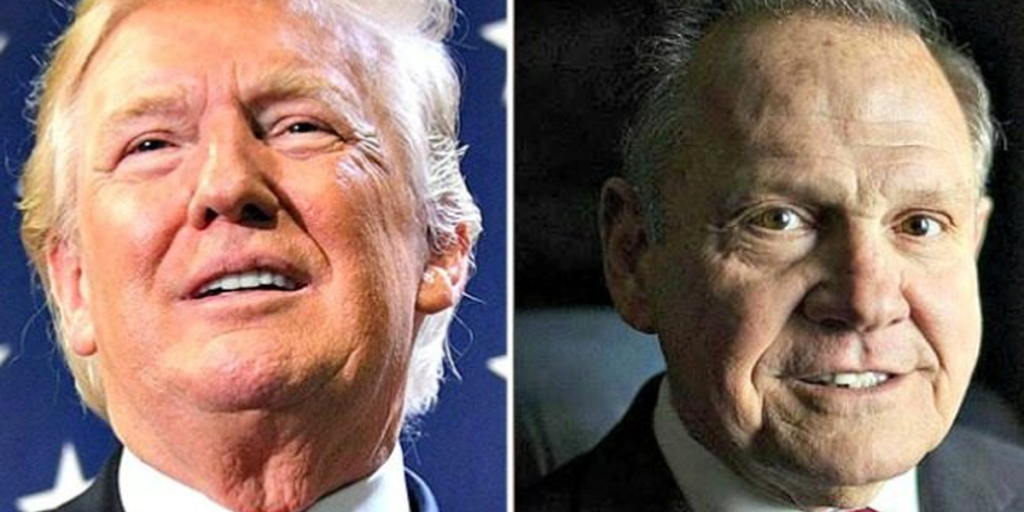
President Donald Trump on Monday formally threw his full support behind Alabama Senate candidate Roy Moore, following weeks of defending him against sexual misconduct allegations and making attacks on his Democratic opponent Doug Jones. Early Monday morning, Trump tweeted his endorsement of Moore: “Democrats refusal to give even one vote for massive Tax Cuts is why we need Republican Roy Moore to win in Alabama. We need his vote on stopping crime, illegal immigration, Border Wall, Military, Pro Life, V.A., Judges 2nd Amendment and more. No to Jones, a Pelosi/Schumer Puppet!” Democrats refusal to give even one vote for massive Tax Cuts is why we need Republican Roy Moore to win in Alabama. We need his vote on stopping crime, illegal immigration, Border Wall, Military, Pro Life, V.A., Judges 2nd Amendment and more. No to Jones, a Pelosi/Schumer Puppet! — Donald J. Trump (@realDonaldTrump) December 4, 2017 According to the Moore campaign, Trump also called the Senate hopeful from Air Force One and expressed “his enthusiastic support for Judge Moore’s candidacy. “ Moore’s campaign later announced the endorsement via Twitter, saying Trump “offered his full support and said he needs a fighter to help him in the US Senate.” “Go get ’em, Roy!” – President Trump Just got off the phone with President Trump who offered his full support and said he needs a fighter to help him in the US Senate. I look forward to fighting alongside the President to #MAGA! — Judge Roy Moore (@MooreSenate) December 4, 2017 A White House official confirmed the call between the President and Moore. “The President had a positive call with Judge Roy Moore during which they discussed the state of the Alabama Senate race and the President endorsed Judge Moore’s campaign,” said White House principal deputy press secretary Raj Shah. Moore said he’s honored to have received Trump’s endorsement. “I am honored to receive the support and endorsement of President Donald Trump,” Moore said Monday morning. “President Trump knows that the future of his conservative agenda in Congress hinges on this election. I look forward to fighting alongside the President to strengthen our military, secure our border, protect our gun rights, defend the sanctity of life, and confirm conservative judges to courts around this nation. We had a good conversation over the phone today and are working together towards conservative victory on December 12.” Moore faces Jones in a special election on Dec. 12.
Testy tweeting free-for-all between Donald Trump, Tenn. GOP Sen. Bob Corker
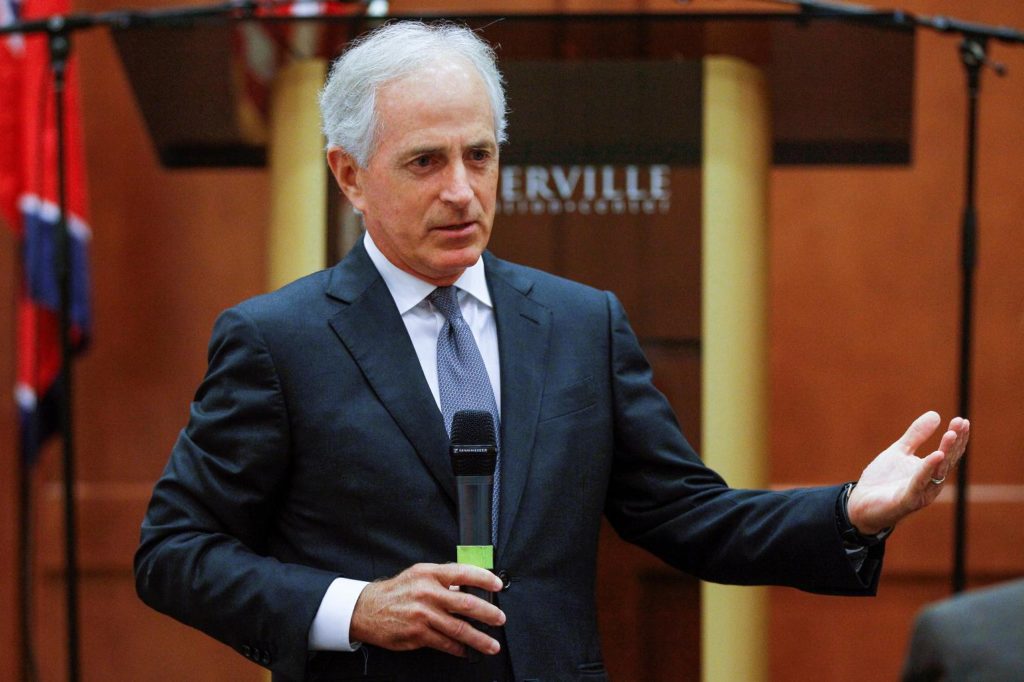
An enraged President Donald Trump and a prominent Republican senator who fears the country could be edging toward “chaos” engaged in an intense and vitriolic back-and-forth bashing on social media Sunday, a remarkable airing of their party’s profound rifts. In political discourse that might once have seemed inconceivable, the GOP’s foreign policy expert in the Senate felt compelled to answer his president’s barbs by tweeting: “It’s a shame the White House has become an adult day care center. Someone obviously missed their shift this morning.” In an interview Sunday with The New York Times, Corker said Trump could set the U.S. “on the path to World War III” with threats toward other countries. Corker also said Trump acted as if he was on his old reality-TV show and that he concerned the senator, adding: “He would have to concern anyone who cares about our nation.” Corker also said his concerns about Trump were shared by nearly every Senate Republican, the paper reported. In a series of stinging tweets earlier in the day, Trump contended Corker: -Was “largely responsible for the horrendous” Iran nuclear deal, which the Democratic Obama administration negotiated and Corker considered badly flawed. The senator also tried to require that President Barack Obama submit the accord to Congress for approval. -Intended to obstruct the White House agenda, though he offered no evidence for saying he expected Corker “to be a negative voice.” -“Begged” for Trump’s endorsement in his 2018 re-election, then opted against seeking a third term when Trump declined, showing the senator “didn’t have the guts to run.” The Associated Press reported that Trump, in a private meeting in September, had urged Corker to run. Corker’s chief of staff, Todd Womack, said Sunday that Trump called Corker last Monday to ask that he reconsider his decision to leave the Senate. Trump “reaffirmed that he would have endorsed him, as he has said many times,” the aide said. -Wanted to be secretary of state, and “I said ‘NO THANKS,’” said Trump, who picked Exxon Mobil’s Rex Tillerson for that Cabinet post. Corker, the Senate Foreign Relations Committee chairman, was mentioned as a possible pick after the election. Trump added another tweet Sunday evening: “Bob Corker gave us the Iran Deal, & that’s about it. We need HealthCare, we need Tax Cuts/Reform, we need people that can get the job done!” Corker always had been one to speak his mind, and even before Sunday’s verbal volleys, his new free agent status promised to make Trump and the party nervous. Already, there was the prospect of even more elbow room to say what he wants and to vote how he pleases over the next 15 months as Trump and the party’s leaders on Capitol Hill struggle to get their agenda on track. Not long before Trump’s tweeting, White House budget director Mick Mulvaney said on NBC’s “Meet the Press” that “it’s going to be fun to work” with Corker, “especially now that he’s not running for re-election, because I think it sort of unleashes him to do whatever – and say whatever – he wants to say.” In his interview with the Times, Corker said: “Look, except for a few people, the vast majority of our caucus understands what we’re dealing with here,” adding that “of course they understand the volatility that we’re dealing with and the tremendous amount of work that it takes by people around him to keep him in the middle of the road.” Corker delivered a rebuke of the Trump White House after the president’s tweets scoffing at Tillerson’s diplomatic efforts to resolve the crisis with North Korea. Corker said Tillerson, along with Defense Secretary Jim Mattis and White House chief of staff John Kelly, are “those people that help separate our country from chaos.” And Corker will be at the center of what may be a stormy debate over the future of the Iran agreement. Trump’s hostility toward the deal has stoked concerns he’s aiming to dismantle the international accord despite Europe’s objections. Corker is opposed to scrapping the agreement outright. “You can only tear these things up one time,” Corker said. “It might feel good for a second. But one of the things that’s important for us is to keep our allies with us, especially our Western allies.” Corker is the latest Republican to face Trump’s wrath. The president in recent months has lit into Senate Majority Leader Mitch McConnell, R-Ky., over the failure of the GOP to repeal and replace Obama’s health care law, and specifically targeted Sens. John McCain, R-Ariz., and Lisa Murkowski, R-Alaska, for their opposition to GOP health legislation. Corker, 65, announced last month that his second, six-year term would be his last. Corker in August delivered a blistering assessment of Trump in the wake of the president’s contentious remarks about the violence in Charlottesville, Virginia. Corker said Trump hasn’t “demonstrated that he understands the character of this nation.” Trump fired back, tweeting that Corker’s comments were strange “considering that he is constantly asking me whether or not he should run again in ’18. Republished with permission from the Associated Press.
Bob Corker’s attacks on Donald Trump highlight broader concerns in GOP
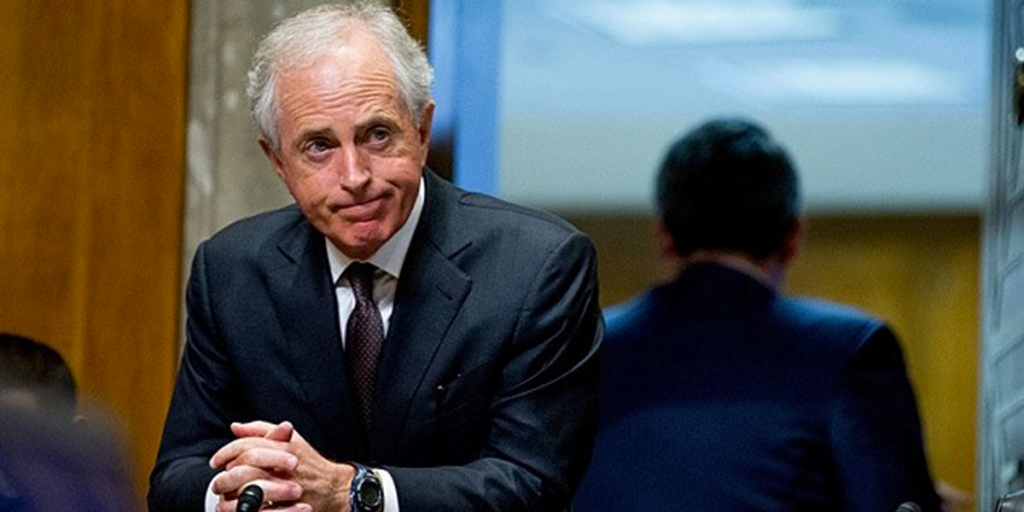
Sen. Bob Corker is hardly the only Republican lawmaker raising dark concerns about harm President Donald Trump might cause the U.S. and the world. But he’s one of the few willing to air those worries in public. Most GOP senators were silent Monday, a day after Corker charged that the White House was an “adult day care” and Trump could set the nation “on the path to World War III.” The only senator who publicly hinted at similar concerns was Iowa Sen. Chuck Grassley, who said both Trump and Corker should “cool it.” “And I think it would help if the president would be the first to cool it,” he added. Tennessee’s Corker, with his Twitter broadsides and an explosive weekend New York Times interview, gave voice to concerns that circulate widely on Capitol Hill about an unpredictable president whose tendency to personalize every issue creates risks for the GOP agenda. But Trump’s enduring popularity with a segment of the GOP base serves as a political muzzle that keeps most elected Republicans from saying anything similar, even those who believe it to be true. Grassley, who won’t be up for re-election until 2022, responded bluntly when asked about the situation. “I don’t see how it’s productive, and I think that two words would kind of answer your question from my point of view: Cool it,” he said. “I think it would be better if we stuck to the issues and leave personalities out of it.” A few other Republican senators who provided public views Monday avoided aligning themselves with Corker. “You’ll have to ask Sen. Corker what led him to make that statement. I haven’t made that statement,” Sen. Marco Rubio of Florida said of Corker’s suggestion that Trump could take the country into another world war. Sen. Jeff Flake has been outspoken in his criticism of Trump, who’s attacked him in return. But the Arizona Republican was restrained during a joint interview with Rubio after a re-election fundraiser in Scottsdale. “Any of us who’ve worked with Sen. Corker know that he speaks his mind,” Flake said, demurring on whether he shares Corker’s view that the White House has become an “adult day care center.” “I agree with him on some things, I’ve supported a lot of his agenda, some things I’ve disagreed with and continue to do so,” Flake said of Trump. The Associated Press sought to contact all 52 Republican senators Monday for their response to Corker’s comments and ask whether they believe Trump is fit for office, a question Corker declined to answer in the Times interview. With the Senate on recess this week and many offices closed for Columbus Day, the inquiries elicited few responses, and those who did largely declined comment. Corker offered no solution to the problem he identified so graphically. Trump is the president, and few doubt that he will remain so, despite constitutional provisions for impeachment or for the vice president to take over if the commander in chief cannot discharge his duties. Moreover, Republicans’ political fortunes remain tied to the president’s. They need his signature if they are to rescue a flagging agenda and pass a tax overhaul, a goal many believe is imperative if the GOP is to retain control of Congress in next year’s midterm elections. So unlike Corker, who recently announced he is not running for re-election in Tennessee, even GOP Trump critics will continue to mute their concerns about his behavior and try to work with the administration. “Sen. Corker, who’s been a strong supporter of the president in the past, is essentially saying the emperor has no clothes,” said Michael Steel, who served as spokesman to former House Speaker John Boehner of Ohio. But, Steel added: “The president was elected under our constitutional system and that’s where we stand. Congressional leaders are going to continue concentrating on doing everything they can to get big things done for the American people, and they hope to have as much support from the administration as possible.” Senate Majority Leader Mitch McConnell of Kentucky, the target of Trump attacks after the Senate’s failure to pass health care legislation, didn’t directly answer when asked at an event in Hazard, Kentucky, whether he shared Corker’s sentiments. “Sen. Corker is a valuable member of the Senate Republican caucus and he’s also on the Budget Committee and a particularly important player as we move to the floor on the budget next week,” McConnell said. His comments underscored what has frustrated Republicans most about the Trump-Corker feud, which burst open Sunday when Trump began tweeting, inaccurately, that Corker had begged for his endorsement and decided not to run for re-election when Trump turned him down. Trump will need Corker if he is to get big tax changes through the Senate, where the narrow GOP majority was unable to pass McConnell’s efforts to repeal the Affordable Care Act. And Corker also figures to be a key player if Trump moves as expected to unwind the Iran nuclear deal. Vice President Mike Pence, in a statement that never mentioned Corker, praised the president for “achieving real results on the international stage. While critics engage in empty rhetoric and baseless attacks.” Republicans do frequently complain about Trump’s attacks on fellow Republicans like McConnell, his failure to stay focused on his legislative agenda and his tendency to make demands on Congress and then blame lawmakers for poor results. But those GOP comments are nothing like Corker’s apocalyptic statements. For House Republicans, who face voters every two years and largely represent conservative districts where support for the president remains strong, there’s even less incentive to turn against the commander in chief. Sixty-eight percent of Republican voters approve of Trump, though that’s down from 80 percent in March, according to a recent AP-NORC poll. Rep. Mark Meadows of North Carolina, chairman of the conservative House Freedom Caucus, criticized Corker, saying he finds “those type of comments to not be appropriate especially coming from the chairman of the Foreign Relations Committee,
Donald Trump tweets take on GOP holdouts on health legislation

Sen. John McCain’s opposition to the GOP’s last-ditch effort to repeal and replace the Obama health law has dealt a likely fatal blow to the legislation — and perhaps to the Republican Party’s years of promises to kill the program. It was the second time in three months the 81-year-old Arizona Republican had emerged as the destroyer of his party’s signature promise to voters. “John McCain never had any intention of voting for this Bill, which his Governor loves. He campaigned on Repeal & Replace. Let Arizona down!” President Donald Trump said in a series of tweets Saturday that attacked GOP senators who hadn’t gotten behind the bill. The measure was co-written by South Carolina Sen. Lindsey Graham, McCain’s closest Senate ally, and Sen. Bill Cassidy, R-La. “McCain let his best friend L.G. down!” Trump said, adding that the health bill was “great for Arizona.” McCain, who is battling brain cancer in the twilight of a remarkable career, announced Friday that he could not “in good conscience” vote for the legislation. “I believe we could do better working together, Republicans and Democrats, and have not yet really tried,” McCain said. “Nor could I support it without knowing how much it will cost, how it will affect insurance premiums, and how many people will be helped or hurt by it.” His opposition all but ensured a major setback for Trump and Senate Majority Leader Mitch McConnell, R-Ky. It also appeared likely to deepen rifts between congressional Republicans and a president who has begun making deals with Democrats out of frustration with his own party’s failure to turn proposals into laws. During the election campaign Trump had pledged to quickly kill the Affordable Care Act — “It will be easy,” he contended — and he has publicly chided McConnell for not winning passage before now. McCain joined Sen. Rand Paul, R-Ky., as two declared GOP “no” votes on the repeal legislation, though Trump held out hope on Paul. “I know Rand Paul and I think he may find a way to get there for the good of the Party!” Trump tweeted. With Democrats unanimously opposed, two is the exact number of GOP votes McConnell can afford to lose. But Sen. Susan Collins, R-Maine, said Friday she, too, is leaning against the bill, and Sen. Lisa Murkowski, R-Alaska, was also a possible “no,” making it highly unlikely that McConnell can prevail. Trump tweeted that health premiums have risen dramatically for Alaskans under the health law, “deductibles high, people angry!” While Trump tries to keep up the pressure, the GOP seems destined to fail again on a campaign promise that every Republican agreed on — right up until the party obtained full control of Congress and the White House this year and was actually in position to follow through. Trump, at a political rally Friday night in Alabama, he said he would continue the fight to repeal the law. “You can’t quit when you have one or two votes short.” Graham, in a statement, said he would “press on,” and he reaffirmed his friendship with McCain. Up until McCain’s announcement, McConnell allies were optimistic McCain’s relationship with Graham might make the difference. GOP leaders hoped to bring the legislation to the full Senate this coming week. They face a Sept. 30 deadline, at which point special rules that prevent a Democratic filibuster will expire. Democrats hailed McCain’s announcement and pledged to commit to the bipartisan process he sought. GOP Sen. Lamar Alexander of Tennessee and Democratic Sen. Patty Murray of Washington have been working on a package of limited legislative fixes to the health law’s marketplaces. “John McCain shows the same courage in Congress that he showed when he was a naval aviator,” said Senate Minority Leader Chuck Schumer, D-N.Y. “I have assured Sen. McCain that as soon as repeal is off the table, we Democrats are intent on resuming the bipartisan process.” Trump charged that Schumer “sold John McCain a bill of goods. Sad.” The Graham-Cassidy bill would repeal major pillars of the health law and replace them with block grants to states to design their own programs. “Large Block Grants to States is a good thing to do. Better control & management,” Trump wrote. But major medical groups said millions of people would lose insurance coverage and protections. A bipartisan group of governors announced their opposition. Yet Republican congressional leaders, goaded by GOP voters and the president himself, were determined to give it one last try. Trump spent much of August needling McConnell for his failure to pass a repeal bill, and Republican lawmakers back home during Congress’ summer recess heard repeatedly from voters angered that after seven years of promises to get rid of the health law, the party had not delivered. The House passed its own repeal bill back in May, prompting Trump to convene a Rose Garden celebration, which soon began to look premature. After the Senate failed in several attempts in July, the legislation looked dead. But Cassidy kept at it with his state-focused approach, and the effort caught new life in recent weeks as the deadline neared. Trump pushed hard, hungry for a win. The bill would get rid of unpopular mandates for people to carry insurance or face penalties. It would repeal the financing for Obama’s health insurance expansion and create a big pot of money states could tap to set up their own programs, with less federal oversight. It would limit spending for Medicaid, the federal-state program that now covers more than 70 million low-income people. Insurance rules that protect people with pre-existing conditions could be loosened through state waivers. Over time, the legislation would significantly reduce federal health care dollars now flowing to the states. But McConnell had little margin for error in a Senate split 52-48 between Republicans and Democrats, and could lose only two votes, counting on Pence to break the tie. Republished with permission from the Associated Press.
Donald Trump demands ESPN apologize for anchor’s tweets

President Donald Trump is calling on ESPN to apologize days after one of the sports network’s anchors called him a “white supremacist” and “bigot.” ESPN said Thursday it had accepted the apology of its “SportsCenter” host Jemele Hill for her tweets about Trump Monday. Hill said Thursday she was sorry for causing her employer trouble. ESPN has repeatedly said Hill’s comments don’t reflect the view of the network. But that apparently hasn’t satisfied Trump. He demanded on Twitter early Friday that ESPN “Apologize for untruth!” The president also took a shot at falling ESPN subscriber numbers, writing: “ESPN is paying a really big price for its politics (and bad programming). People are dumping it in RECORD numbers.” The network didn’t immediately issue a response to the president’s comments Friday.
Donald Trump renews Twitter criticism of Amazon

President Donald Trump is renewing his attacks on e-commerce giant Amazon, and he says the company is “doing great damage to tax paying retailers.” Trump tweets that “towns, cities and states throughout the U.S. are being hurt – many jobs being lost!” The president has often criticized the company and CEO Jeff Bezos, who also owns The Washington Post. Many traditional retailers are closing stores and blaming Amazon for a shift to buying goods online. But the company has been hiring thousands of warehouse workers on the spot at job fairs across the country. Amazon has announced goal of adding 100,000 full-time workers by the middle of next year. Trump has in the past tweeted that Amazon was not paying “Internet taxes.” But it’s unclear what he meant by that. Amazon.com collects state sales taxes in all 45 states with a sales tax and the District of Columbia, according to their website. State governments have sought to capture sales taxes lost to internet retailers, though they have struggled with a 1992 Supreme Court ruling that retailers must have a physical presence in a state before officials can make them collect sales tax. Amazon did not immediately respond to an emailed request for comment. Republished with permission of The Associated Press. Amazon is doing great damage to tax paying retailers. Towns, cities and states throughout the U.S. are being hurt – many jobs being lost! — Donald J. Trump (@realDonaldTrump) August 16, 2017
Donald Trump doubles down on support for Luther Strange in new Tweet

President Donald Trump jumpstarted his Monday morning doubling-down on Tweet he made last week, publicly throwing his support behind Alabama-Republican U.S. Sen. Luther Strange once again. “Luther Strange of the Great State of Alabama has my endorsement. He is strong on Border & Wall, the military, tax cuts & law enforcement,” Trump tweeted before 7:00 a.m. ET on his way back to D.C. Luther Strange of the Great State of Alabama has my endorsement. He is strong on Border & Wall, the military, tax cuts & law enforcement. — Donald J. Trump (@realDonaldTrump) August 14, 2017 In a surprise move, Trump took Twitter and endorsed Alabama Sen. Luther Strange, last week ahead of the state’s Aug. 15 primary. “Senator Luther Strange has done a great job representing the people of the Great State of Alabama. He has my complete and total endorsement!,” Trump tweeted primetime Aug. 9. Strange was appointed to the seat in February by former Gov. Robert Bentley following the confirmation of Attorney General Jeff Sessions, and is currently serving as a temporary Senate appointment. He is competing in the August primary to fill out the remainder of Sessions’ 6-year term through 2020. On Tuesday, Strange will face a bevy of Republican challengers at the polls including former Ala. Chief Justice Roy Mooreand Alabama 5th District U.S. Rep. Mo Brooks — arguably his top two competitors. If no candidate receives at least 50 percent of the vote, a runoff will take place Sept. 26, with the general election scheduled for Dec. 12.


